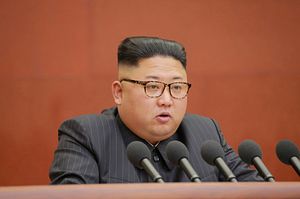North Korea’s recently concluded the second plenary meeting of the central committee of the Workers’ Party of Korea (WPK). The event came a day before the 20th anniversary of Kim Jong-il becoming the WPK’s general-secretary on October 8 and two days before the WPK’s 72nd foundation day on October 10. Supreme Leader Kim Jong-un’s elevation of his sister Kim Yo-jong to the Politburo received some attention in recent days, but his speech at the second plenary meeting is a notable reminder of the continued ideological salience of the byungjin concept.
As I’ve emphasized before in these pages, while it might seem like North Korea is exclusively focused on its long-range ballistic missiles and nuclear weapons, the byungjin ideological project continues to guide Kim Jong-un’s regime. While headlines this year mostly fixated on North Korea’s nearly biweekly ballistic missile launches, comparatively less attention fell on Kim Jong-un personally inaugurating Pyongyang’s Ryomyong Street — a symbol of the second leg of byungjin, economic prosperity.
Kim’s speech last week, accordingly, gave considerable attention to North Korea’s economy. This was especially significant in light of United Nations Security Council resolution 2371 in August and 2375 in September, after North Korea’s intercontinental-range ballistic missile test and thermonuclear bomb tests respectively. International sanctions against North Korea were considerably expanded, with a range of important commodity exports, including seafood, lead, and iron, coming under coverage. Resolution 2375 even included, for the first time, maritime interdiction provisions for vessels that would transport and deliver sanctioned goods to and from North Korea.
Kim’s speech was paraphrased by North Korea’s state-run Korean Central News Agency and the economy features prominently. (A comprehensive detailing of the second plenary meeting of the central committee, along with the KCNA readout of Kim’s speech, has been posted by North Korea Leadership Watch.) In his remarks, Kim noted, according to KCNA, that the way to triumph over the “extremely vicious sanctions … and turning misfortune into a blessing is just self-reliance and the sci-tech strength.”
While North Korea’s missile and nuclear programs no doubt deserve attention, we shouldn’t lose sight of the regime’s plainly stated economic ambitions. Byungjin isn’t just for show ideologically. The Kim regime does seek absolute security through its nuclear deterrent, but the economy too continues to remain an important consideration for Kim.
































